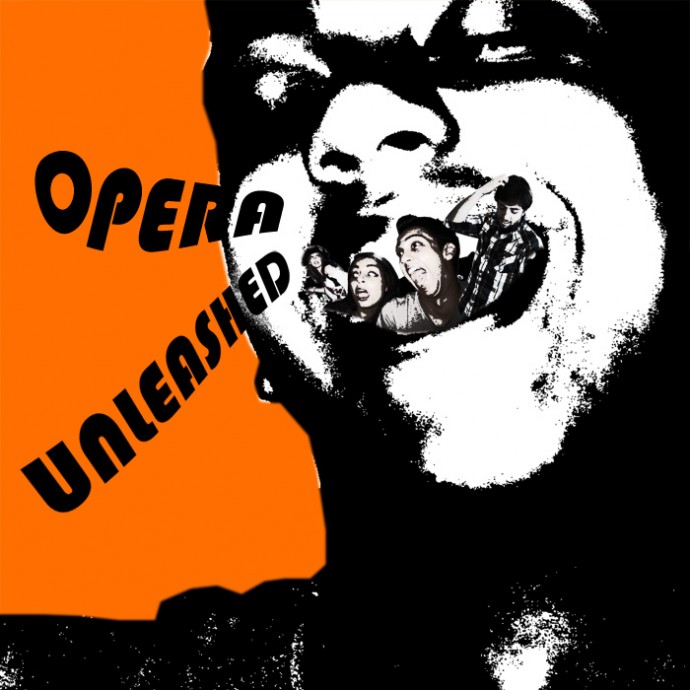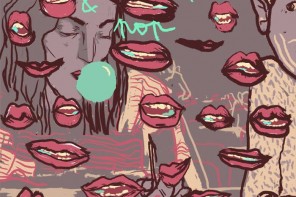Viking helms, sophisticated old people and glass shattering; Opera doesn’t usually require explaining before these stereotypes spring to mind. But how many of us have, on our own terms, experienced an Opera? How many of us really get it? Kiez Opera, a young production team in Berlin, aims to resolve this alienation and bring the magic, surreality and drama of traditional Opera into contemporary life in unconventional places. We discussed their challenges and how Berlin is the perfect cityscape to hi-jack and surprise people with this previously exclusive art form.
Our initial idea was to do an Opera show that was not in a big Opera house in Charlottenburg (the affluent district of Berlin) but in the more eclectic, younger, multi-cultural districts. We called up a nightclub called Renate, pitched our idea to them and it all came together within a month and a half. Renate thought it was a great concept and were interested in helping us out which we didn’t expect at all.
There are two of us directing Kiez Opera and we come from very different musical backgrounds, one of us is a trained singer and the other has no experience with opera at all and came from a rave background. We are combining our opera shows with a rave afterwards which we feel adds to the appeal.
Opera has a reputation for being elitist or snobby, even if people don’t see it that way, there isn’t much of an access point to this art. Opera is no different than listening to your favourite music or watching a film—it’s another way of expressing or communicating something. I guess the cliché is extreme emotion; love, death, revenge, hate, jealousy. It’s an exaggeration of life. If something is good art, whatever it is, it will strongly connect with people and they will take something from it and feel inspired by it. It stimulates a new direction and opens them up to new things. Music that has been appreciated for over 400 years is worth checking out, it’s not a sign it’s always good, but it’s a sign that there is something to it and our feedback proves that when people see it, they love it. The quality is also important to us, a lot of the people we work with are very talented musicians and young singers from the International Studio at the Staatsoper and I think that makes a difference because even if you don’t know anything about opera you will recognise the power and beauty of their voices.
We started out not knowing how the crowd was going to react. An opera crowd is not usually much fun to be in; you’re either sitting there or clapping a lot. Moving to a club environment, where people act a bit more freely, we noticed made a huge difference. Our first show attracted the party crowd looking for a place to go out at that weekend so it was a mix of them watching the show and them doing their own thing. There were people hanging around on the river boat singing along, the audience were in the boat and participating in the performance. They were drinking, celebratory and it was a very interesting mix. People watching an opera in that way doesn’t really happen.
It was a bit terrifying when you don’t know what people are going to do or whether they will pay attention to the story so, the only way we could think to do it was by getting the audience actively involved- and the people really did get into it. Our show in Renate was a great love story and there was an argument as part of the performance where I slapped the guy and people were cheering. They were completely captivated by it. Entertainment should really take you away like that. The audience does not need to be separated from the performer and the line between fantasy and reality does not need to be so obvious. We had the chorus amongst the audience, whispering to them and running around pushing people out of the way.
As I see it, there are two separate aspects of the formality imposed by Opera house settings. First, there’s the lesser point of the dress-code aspect, which isn’t such a big deal here in Germany. Certainly, people ‘dress up’ for the opera sometimes, and if they feel like it, that’s great. In Britain, particularly in London, dressing for the opera (and to show off your wealth) is still a big part of the opera experience. There are opera festivals in Britain that operate a strict dress code which is potentially as alienating as the price of the tickets. It’s true that people do behave differently when they are dressed up or down but, I don’t think that is at all the crux of the problem. It isn’t the reason why the younger generation stay away from the opera house.
One of the main opera houses in London ran a campaign last year, encouraging people to dress-down for the opera, in an attempt to bring younger folks to the opera house. For me, this initiative was either missing or avoiding other greater obstacles that stand in the way of introducing opera to a younger generation.
I personally think it is great to have the excuse/opportunity to dress differently to the way you would in everyday life, be it because you’re heading to a festival, club or indeed the opera house. It allows you to play a different role for a while. But that has nothing to do with dressing to display wealth or social position. We loved that people came to our Dido and Aeneas show at Renate dressed for the club, so that after the show there was a glorious mix of performers and punters; you couldn’t tell which were which.
Then, there’s the second and main point of changing the location. The formality of silence during a performance imposed by opera house settings is a relatively new thing. Opera used to be seen, in the time of Rossini etc. in particular as part of a general entertainment, where people would drink and play cards and check out what was happening on stage when they felt like it. I’m not saying that that is exactly what we’re after, but our audience in Renate definitely felt completely unrestricted and comfortable in vocalising their reactions. I think that also had something to do with being completely involved in the experience. They weren’t sitting in silence in the dark in an opera house, yet they were totally focused on the narrative of the piece.
As we create site-specific opera, we exploit our surroundings to full effect because each show won’t be performed more than twice. For example, our ‘Insanity’ show will definitely be a show where people, are again, surrounded by and completely immersed in the experience, even more so than the first production because there will be no stage. The performers will be amongst the crowd, coming from behind, above, and below. I think the unique combination of the space and unusual combination of music and subject matter will take the audience on a completely different, more surreal journey than one they’d normally experience in an opera house. We put the ‘Insanity’ production together ourselves and have more freedom to play around with it and mix different sound through it. The music already existed but we’re doing something new with that too. For example, it is very unusual for compositions by Gesualdo to be staged or written as an opera. He wrote tortured music to be performed with roughly 10 people standing in a semicircle. 400 years ago, Gesualdo stabbed his wife for cheating on him and her lover, it was regarded as a crime of passion so he staged her murder. At Renate, the performance was open-air and this will be indoors in a drained swimming pool so will add a heavier ambience to effect.
In Berlin, it seems possible to be able to change the elitist reputation opera has. The owners of popular venues are not afraid of doing something new and are more inclined to take risks. This is a big deal if you consider how they didn’t know anything about us and gave us the chance. Berlin is a transient population to an extent, people are here for a few years and want to experiment, see new stuff and the city is full of creative people who are just partying; there is a creative atmosphere here and money issues aside, London is so big that it’s hard to find the crowd. There is also an atmosphere of openness here which sounds like a cliché but people are generally interested and have faith in what we are doing, want to talk to us and want to witness things they haven’t seen before. People in London work hard all week and only have one night to do what they like, which is understandable, but people here have more freedom to explore alternatives.
We really push the boat out in creating a huge spectacle; it is going to be awesome. Opera houses have a lot of money and it’s cool we can do it on zero budget with no funding besides pre-sales. We took risks and will continue to take more to make the shows as entertaining and interesting as we can.







